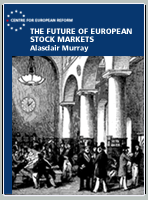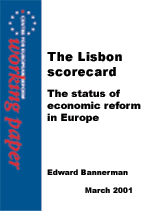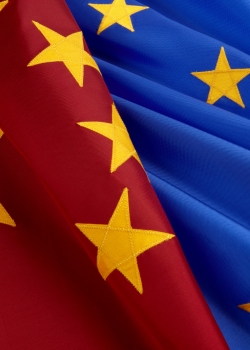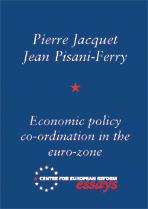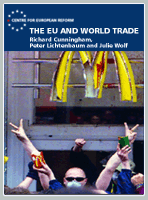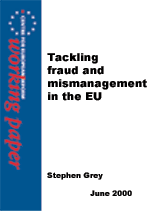Single market, competition & trade
The euro comes of age
03 December 2001
A dozen years after the Delors Committee produced a plan for Economic and Monetary Union, the euro finally becomes a reality for 300 million Europeans this January.
Policing global competition
01 August 2001
The fall-out from the European Commission's decision to veto the proposed $42 billion merger between General Electric and Honeywell shows how competition policy is becoming politicised.
Issue 19 - 2001
27 July 2001
- Policing global competition, Edward Bannerman
- France, Germany and "hard-core" Europe, Charles Grant
- Speeding up European justice, Matthew Heim
Workers are entitled to consultation
01 June 2001
In the last issue of the CER Bulletin, James Wilson argued against the European Commission's proposal for a directive on employee information and consultation. Sadly, in order to do so, he resorted to many of the crude misrepresentations which are common currency among business opponents of the initiative.
We...
We...
Issue 18 - 2001
25 May 2001
- Time to act in the Middle East, Steven Everts
- Workers are entitled to consultation, John Monks
- EU should duplicate NATO assets, Kori Schake
The future of European stock markets
04 May 2001
Alasdair Murray look at how the absence of a single market in equities within the EU increases the cost of capital and restricts Europe's ability to close the economic gap with the United States.
Don't legislate on consultation
02 April 2001
No-one who runs a business needs to be told that staff are a company's best ambassadors. There is ample evidence that a well-informed and motivated workforce can add value to the bottom line. Proper consultation is vital to ensuring long-term success. But if a firm wanted to improve its workforce...
Issue 17 - 2001
30 March 2001
- The stockholm scorecard, Edward Bannerman
- An EU senate is superfluous, Richard Corbett
- Don't legislate on consultation, James Wilson
The Lisbon scorecard: The status of economic reform in Europe
02 March 2001
It will be left to future historians to appreciate fully the significance of the Lisbon Summit of March 2000 in the economic evolution of Europe. But it is already possible to argue that its impact could be even more farreaching than that of the euro.
Making Lisbon work in Stockholm
01 February 2001
Even by the standards of the EU's often optimistic policy aspirations, the decade-long economic reform process initiated at the Lisbon summit last March represents an ambitious programme.
The distinctive feature of the Lisbon conclusions is not the pledge of EU leaders to create "the most competitive and dynamic knowledge...
The distinctive feature of the Lisbon conclusions is not the pledge of EU leaders to create "the most competitive and dynamic knowledge...
Issue 16 - 2001
26 January 2001
- Turning East: Europe Courts Asia, Edward Bannerman
- Opening Europe's final frontier, Carl Bildt
- Making Lisbon work in Stockholm, Alasdair Murray
Economic policy co-ordination in the eurozone: What has been achieved? What should be done?
05 January 2001
Now that the euro has stabilised, Greece has joined EMU and the EU has committed itself to enlargement, the time is right to consider these critical issues of economic governance.
The "open method of co-ordination": Innovation or talking shop?
01 December 2000
At the 'dot.com' Summit AT Lisbon in March 2000, the EU set itself the strategic goal of creating full employment in a competitive and inclusive knowledge-based economy.
Issue 21 - 2001
24 November 2000
- NATO's big bang , Andrew Cottey
- Time to abolish the EU's rotating presidency, Steven Everts
- The euro comes of age, Alasdair Murray
The EU and world trade
08 September 2000
The paradox of trade policy is that, at a time when political leaders in most parts of the world have accepted the intellectual case for trade liberalisation more thoroughly than ever before, public opposition to free trade is on the rise.
The EU and world trade
01 August 2000
The collapse of the Seattle meeting of the World Trade Organisation in December 1999 was a blow to the EU, which had first proposed the idea of a "millennium round" of trade liberalisation.
Reforming the euro club
01 August 2000
And so farewell the euro-11. In future, the adhoc group of eurozone finance ministers will be known as the Euro Group, its powers beefed up along the lines dictated by the French government.
Issue 13 - 2000
28 July 2000
- Europe's new political flexibility, Steven Everts
- Reforming the euro club, Alasdair Murray
- The EU and world trade, Julie Wolf
Tackling fraud and mismanagement in the EU
02 June 2000
The European Union's political leaders have great ambitions for the years ahead: a successful economic and monetary union, a coherent and effective foreign policy, and the accession of up to 12 new member-states.
Federalism's last gasp
01 June 2000
The prospect of a two-tier Europe, with Britain outside the core, causes alarm in Downing Street. Joschka Fischer's vision of a European federation - with a group of more ambitious states forming its vanguard - is the latest such proposition, albeit one for the long-term. But does Tony Blair have much to fear?














